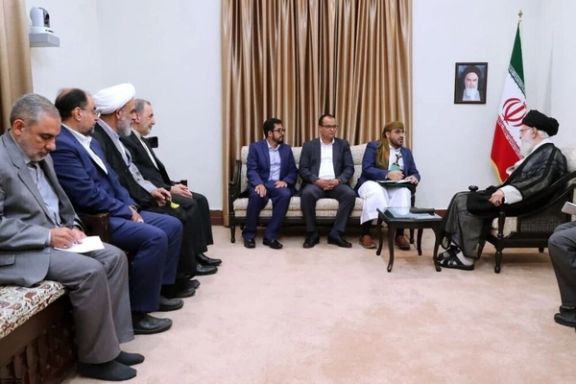Exclusive: US Confirms Deceased Iran Envoy Is Not Wanted IRGC Operator

US State Department told Iran International that the deceased former Iran envoy with Houthis was not the IRGC operator with a 15-million reward on his head.

US State Department told Iran International that the deceased former Iran envoy with Houthis was not the IRGC operator with a 15-million reward on his head.
A State Department spokesman on Wednesday [Dec. 22} had confirmed to Iran International that Hassan Irloo, the Iran envoy with Houthis who was evacuated from Sanaa earlier and died shortly after was a senior member of the Revolutionary Guard, but had not clarified if he was a person wanted by the United States.
On Thursday however, the State Department confirmed to Iran International that Irloo was not general Shalaei, a mysterious figure sought by the US, with a $15 million reward on his head.
The Iranian government's official news agency IRNA in a Tuesday report on Irloo's death had said that "he was also known as General Shahlaei", raising suspicion about his identity and mission in Yemen.
Later in the evening, however, the agency had deleted the reference to Shahlaei – aka Hajj Yusef and Yusuf Abu-al-Karkh -- who is an IRGC’s Qods (Quds) Force commander classified by the US government as a terrorist.
When asked if Irloo is the same person as Shahlaei on Wednesday, the spokesperson had not given a clear answer but said that "the reward for Abdul Reza Shahlaei still stands." Subsequently on Thursday, the State Department said that the two individuals were indeed different people.

On the third of January 2020, the night when the United States killed the head of the Qods Force Qasem Soleimani, the US military attempted to also assassinate Shahlaei via a drone strike. The drone strike in Sana'a, where Shahlaei was said to be based, failed to kill him but did lead to the death of a lower-ranking IRGC member Mohammad Mirza.
It remains a possibility that the IRNA statement saying Irloo and Shalaei were the same people could have been a diversionary move to throw others off Shalaei's tracks.
One thing remains clear that Irloo (Irlu or Irlou) himself was a senior IRGC operator who spent years on secret missions with militant groups throughout the region and was sent to Yemen as "ambassador" in Sanaa, controlled by Iran-aligned Houuthis.
Irloo's importance and staure cannot be underestimated. Leader of the Islamic Revolution Ali Khamenei issued a message of condolence Wednesday over Irloo’s death, describing him as an “efficient envoy” with a track record of” political struggle, diplomatic endeavors, and social activism”.
On Thursday, Chairman of the Chiefs of Staff of the Iranian Armed Forces Major General Mohammad Bagheri called Irloo a martyr of the Islamic Revolution who dedicated his life to the resistance axis in the region.
The title shahid (martyr) is usually reserved for those killed in battle and 'resistance' is a term the Islamic Republic uses to describe its allies and proxies in the region.
At Irloo's funeral ceremony Wednesday, deputy commander of the IRGC, Ali Fadavi, also named him as a “fighter in the resistance front" and accused the US and its allies of delaying Irlou’s evacuation from Sanaa and his death.
Even before reportedly catching COVID-19, he was already suffering from respiratory problems sustained in chemical attacks during the Iran-Iraq war.
The Wall Street Journal in a report last week claimed that Houthis had asked Tehran to remove Irloo from Sanaa. Both Iran and the Houthi leadership denied the report, insisting that the ambassador suffered from Covid and needed to receive medical attention in Iran.